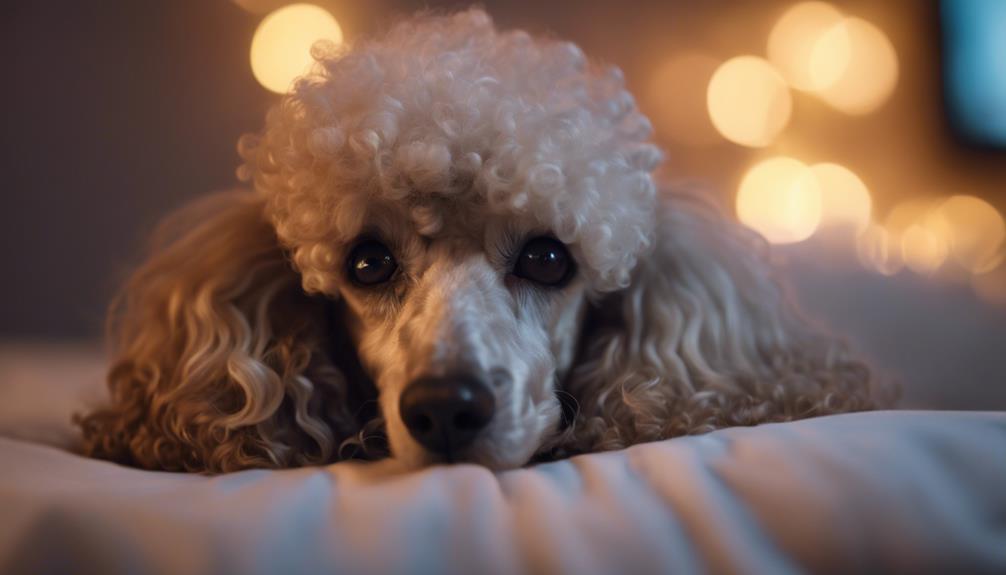Just like tending to a delicate garden that requires nurturing and attention, establishing nighttime routines and sleep training for your poodle is crucial for their well-being. But what if your poodle seems resistant to the routine you've been trying to implement? There might be more than meets the eye when it comes to your furry friend's nighttime habits. Let's explore some effective strategies and insights that could help you and your poodle achieve a peaceful night's rest together.
Key Takeaways
- Consistent routines and bedtime habits establish security and promote better health in poodle puppies.
- Creating a peaceful sleep environment with familiar items enhances comfort and ensures restful nights.
- Positive reinforcement techniques, like clicker training, strengthen desired behaviors and the bond with your poodle.
- Nighttime playtime, supervision, and proper crate training are essential for managing separation anxiety and promoting good sleep habits.
Importance of Nighttime Routines
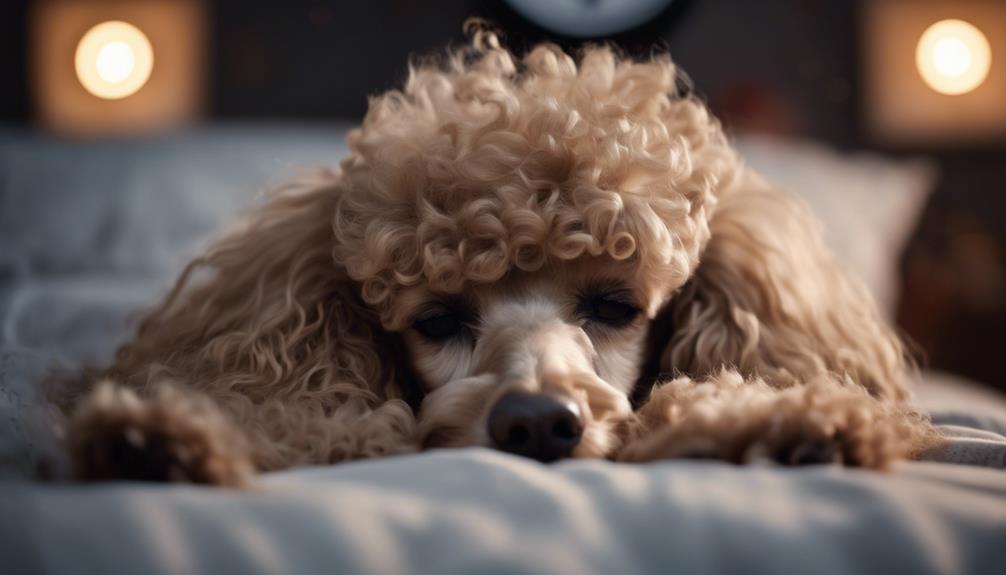
Establishing a consistent nighttime routine for your poodle puppy is essential for their sense of security and overall well-being. Poodle puppies, just like human babies, thrive on routine. This predictability helps them feel secure and lowers their stress levels, ultimately benefiting their health. Regular exercise during the day is crucial for your poodle puppy to expend energy, making it easier for them to settle down at night. By incorporating playtime and walks into their daily routine, you can promote better sleep quality for your furry companion.
Ensuring that your poodle puppy gets the recommended 10 hours of sleep each night is vital for their growth and development. A structured bedtime routine not only helps them physically but also mentally. It sets boundaries and teaches them when it's time to unwind and rest. By starting these habits early on, you can prevent potential behavioral issues and create a harmonious environment for both you and your poodle puppy.
Setting up a Sleep Environment
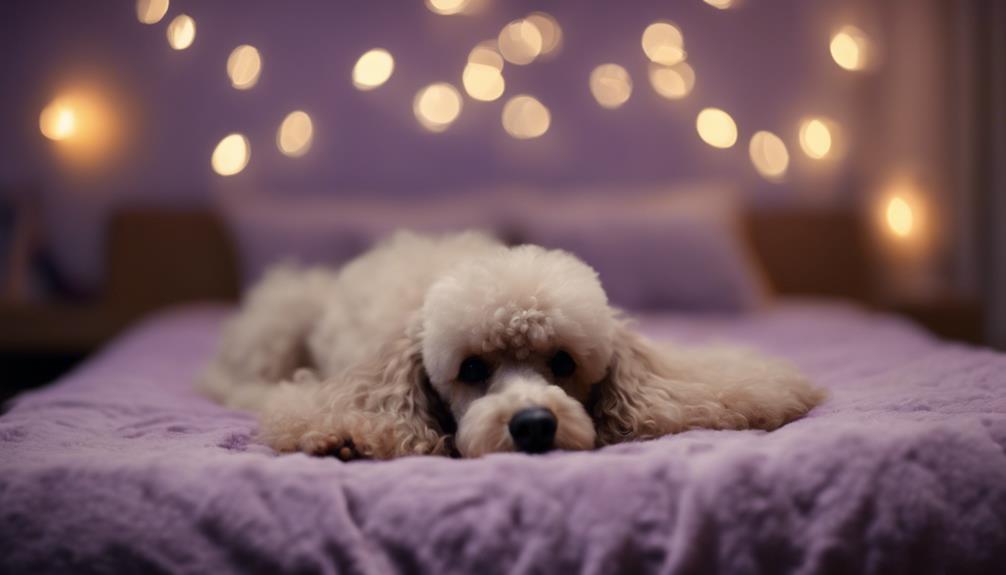
Creating a cozy and conducive sleep environment for your poodle puppy is key to promoting restful nights and overall well-being. Here are three essential tips to set up the perfect sleep environment for your furry friend:
- Provide a spacious crate: Offer your poodle puppy a comfortable bed within a spacious crate. This designated sleeping area will give them a sense of security and a place to call their own.
- Ensure a quiet and dimly lit space: Create a peaceful atmosphere by keeping the sleeping area quiet, dimly lit, and free from disturbances. This environment will help your puppy relax and unwind before bedtime.
- Add familiar items: Place familiar and comforting items like a blanket or toy in the crate. These items can provide a sense of familiarity and security, enhancing your poodle puppy's comfort and promoting better sleep.
Establishing a Bedtime Routine
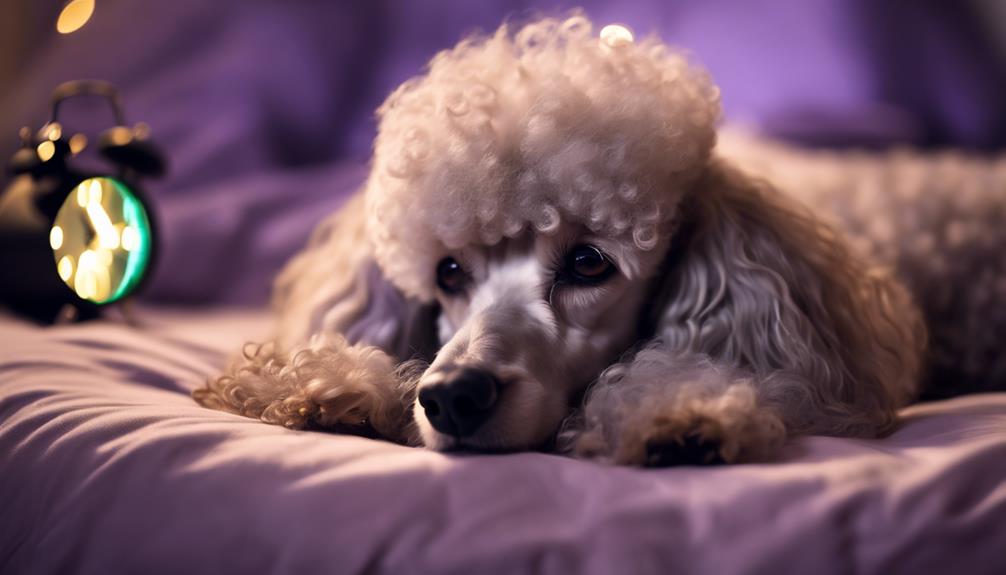
To set your poodle puppy up for a restful night's sleep, begin winding down around 9 pm with light exercises and a calm evening environment. Making sure your puppy gets plenty of exercise during the day can help them stay healthy and sleep better at night. A bedtime routine can be beneficial for both you and your furry friend, creating a sense of predictability and comfort. Here is a simple guide to help you establish a bedtime routine for your poodle puppy:
| Task | Description |
|---|---|
| Light exercises | Engage in gentle play or short walks to help your puppy relax before bedtime. |
| Calm evening environment | Create a peaceful atmosphere by dimming lights and keeping noise levels low. |
| Crate training games | Use positive reinforcement to make the crate a comfortable and inviting space for bedtime. |
| Consistent bedtime | Stick to a regular bedtime to help your puppy adjust to a sleep schedule. |
| Affectionate goodnight routine | Show love and care before saying goodnight to your poodle puppy. |
Consistency Is Key
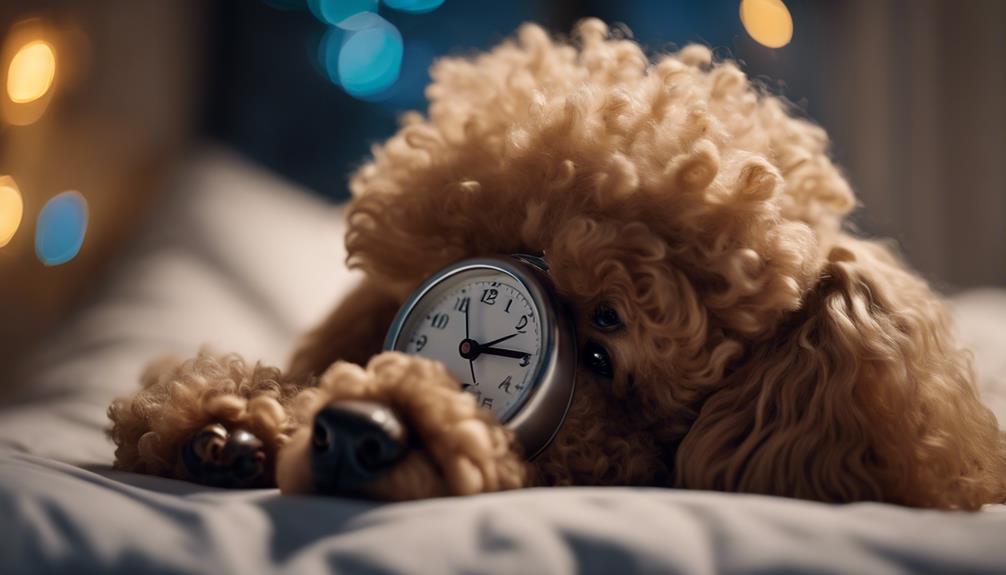
Ensuring consistency in your poodle's nighttime routine is crucial for their well-being. Set clear boundaries, stick to a schedule, and use positive reinforcement techniques to establish a stable bedtime routine. By maintaining consistency, you can help your poodle feel secure, reduce anxiety, and promote better sleep habits.
Set Clear Boundaries
Consistency plays a crucial role in helping poodle puppies understand the importance of bedtime boundaries for a peaceful night's rest. To set clear boundaries effectively, consider the following:
- Establish Rules: Define what is expected during bedtime to prevent confusion and create a routine.
- Avoid Giving In: Stay firm and resist giving attention to whining or demands during the night to maintain boundaries.
- Redirect Behavior: If the puppy tries to leave the sleeping area, calmly guide them back to reinforce the boundaries.
Stick to Schedule
For a poodle puppy's peaceful night's rest, sticking to a schedule is key. Setting boundaries and maintaining consistent routines are essential for ensuring your puppy understands when it's time to rest. Puppies thrive on predictability, finding comfort and security in knowing what to expect. By adhering to a regular bedtime routine, you help regulate your puppy's sleep patterns, promoting better overall sleep quality. Deviating from the established schedule can disrupt your puppy's routine, leading to potential sleep disturbances. Consistency is crucial in providing your poodle puppy with the structure they need for a restful night. Remember, a well-maintained schedule not only benefits your puppy but also enhances your bond through a shared understanding of bedtime expectations.
Positive Reinforcement Techniques
By consistently implementing positive reinforcement techniques in your poodle puppy's bedtime routine, you can help them associate sleep time with positive experiences. Here are some key strategies to aid in your poodle's sleep training journey:
- Clicker training methods: Using a clicker to mark and reward desired behaviors can be highly effective in reinforcing positive habits.
- Interactive playtime: Engaging in interactive play sessions before bedtime can help tire out your poodle, making it easier for them to settle down for the night.
- Positive reinforcement rewards: Offering treats, toys, or verbal praise when your poodle follows the bedtime routine can motivate them to continue the behavior.
Consistency in applying these techniques will not only improve your poodle's sleep habits but also strengthen your bond with them.
Avoiding Stimulants Before Bed
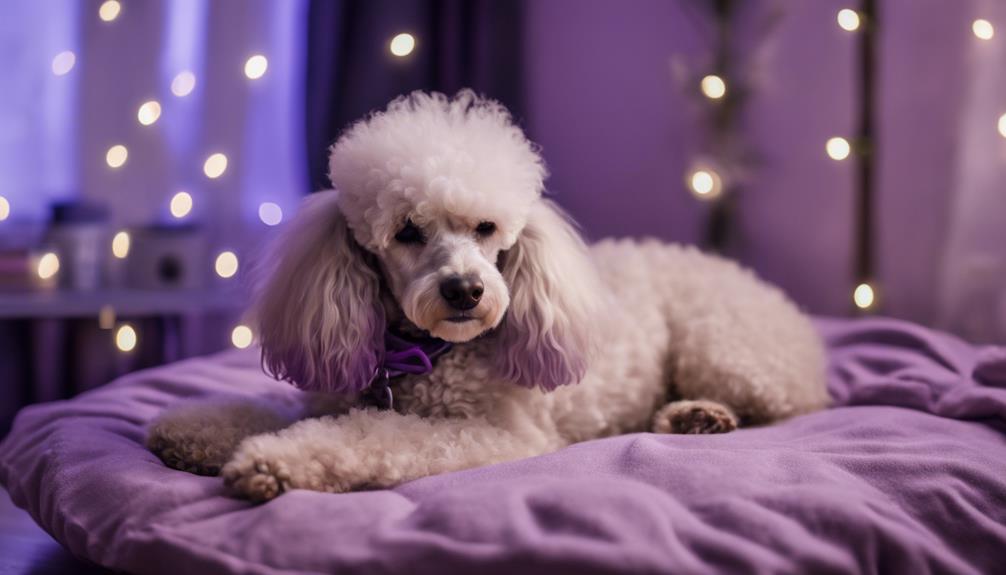
To help your poodle relax before bedtime, steer clear of engaging in stimulating activities or giving high-energy toys or treats close to when they should sleep. Avoid vigorous play or exciting games that may amp up your puppy before sleep. It's essential to limit exposure to loud noises and bright lights that can disrupt your poodle's winding-down process. Instead, opt for calming activities like gentle petting or quiet play to help your puppy relax before bed. Establishing a soothing pre-bedtime routine can also signal to your poodle that it's time to unwind and prepare for sleep. Consider incorporating calming techniques, such as gentle strokes or soft music, to create a tranquil environment. Remember to avoid introducing any stimulating elements that could interfere with your poodle's ability to settle down and rest peacefully. By prioritizing relaxation methods and minimizing stimulants before bedtime, you can help your poodle achieve a peaceful night's sleep.
Exercise for Better Sleep

Ensuring your poodle gets enough exercise during the day is crucial for a good night's sleep. Engaging in activities that promote physical tiredness can help your puppy wind down and relax before bedtime. Remember to balance playtime with rest to maintain your dog's overall well-being.
Physical Activity Benefits
Regular exercise plays a crucial role in supporting better sleep for poodle puppies by helping them burn excess energy and establish healthy sleeping routines. To fully grasp the benefits of physical activity for your poodle's sleep, consider the following:
- Outdoor adventures: Taking your poodle for outdoor walks or runs can provide both physical exercise and mental stimulation.
- Indoor playtime: Engaging in indoor games like fetch or hide-and-seek can be a fun way to ensure your poodle gets enough exercise.
- Energy release: Allowing your poodle to release pent-up energy through play can lead to a more relaxed and restful sleep at night.
Evening Playtime Importance
Engage your poodle puppy in evening playtime to help them release excess energy and prepare for a restful night's sleep. Playtime benefits your puppy by allowing them to unwind and tire out, promoting relaxation essential for a good night's rest. Activities like fetch, tug-of-war, or short training sessions are excellent for energy release and relaxation promotion. Even on days with bad weather, indoor games can serve as a great alternative for evening playtime. By establishing consistent evening playtime routines, you create a calm and peaceful bedtime environment that aids in your poodle puppy's overall well-being. Remember, a little playtime goes a long way in ensuring your furry companion gets the rest they need.
Supervision During the Night
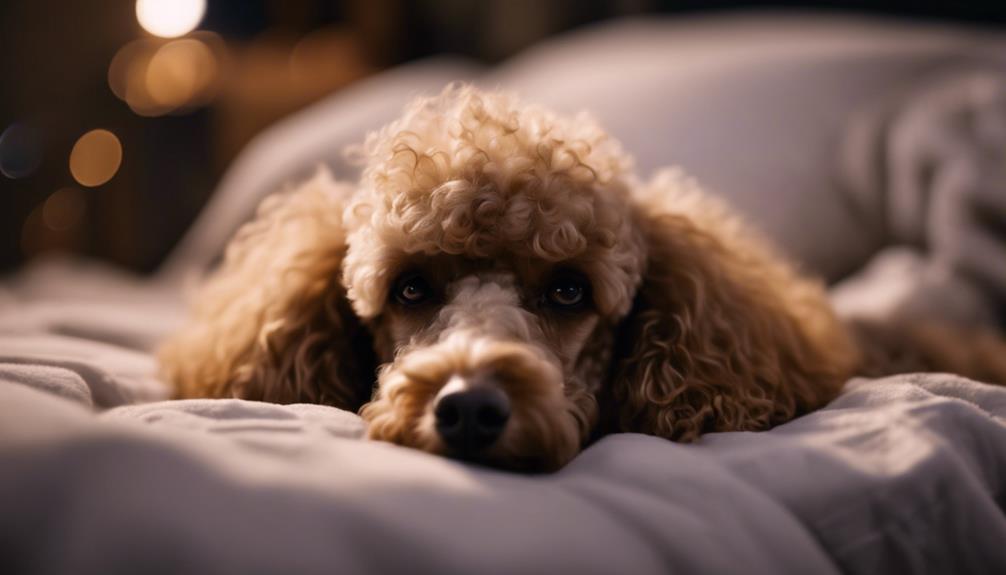
To ensure the safety and well-being of your poodle puppy at night, diligent supervision is essential. Here are key reasons why nighttime supervision is crucial:
- Nighttime supervision benefits: Monitoring your poodle puppy during the night allows you to intervene promptly if any issues arise, ensuring their safety and comfort.
- Poodle sleep patterns: Observing your puppy's behavior at night provides valuable insights into their sleep patterns, helping you tailor their nighttime routine for better rest.
- Preventing accidents at night: By keeping a close eye on your puppy during the night, you can proactively prevent accidents, such as soiling in the house or getting into potentially harmful situations.
Handling Nighttime Whining
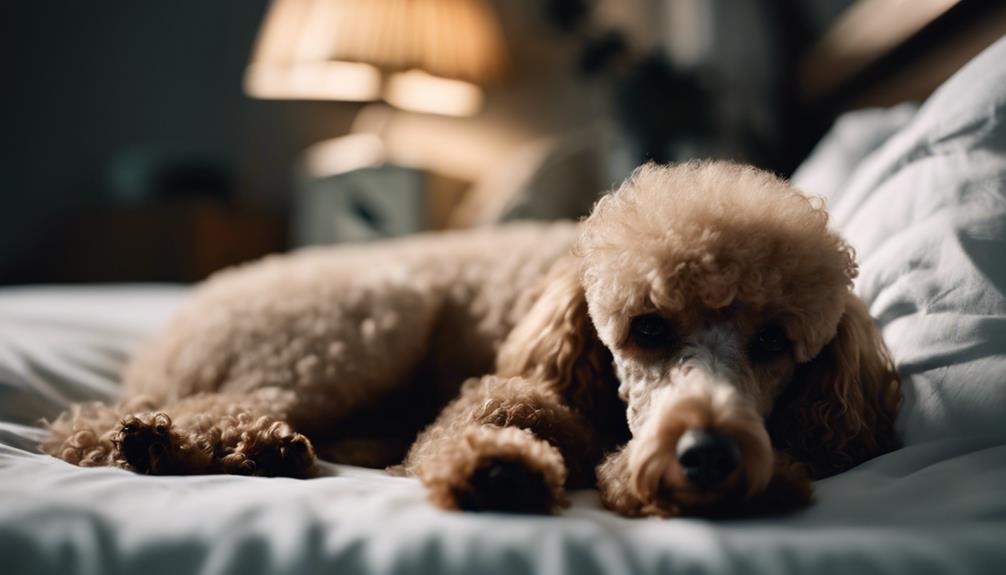
When your poodle puppy whines at night, responding promptly and appropriately is key to addressing their needs effectively. Understanding your puppy's behavioral cues can help determine if they genuinely need to go potty or if they are seeking attention. If a potty break is not necessary, using calming techniques like gently comforting them without removing them from the crate can help reinforce positive sleep associations. It's essential to avoid engaging in prolonged interactions or play during nighttime whining to maintain a calm environment conducive to sleep. Gradually increasing the time between potty breaks can assist in reducing nighttime whining over time as your puppy learns to self-soothe and settle down. Remember to use positive reinforcement and praise when your puppy is quiet at night, encouraging them to continue this behavior and promoting a peaceful nighttime routine for both you and your poodle.
Crate Training for Poodles
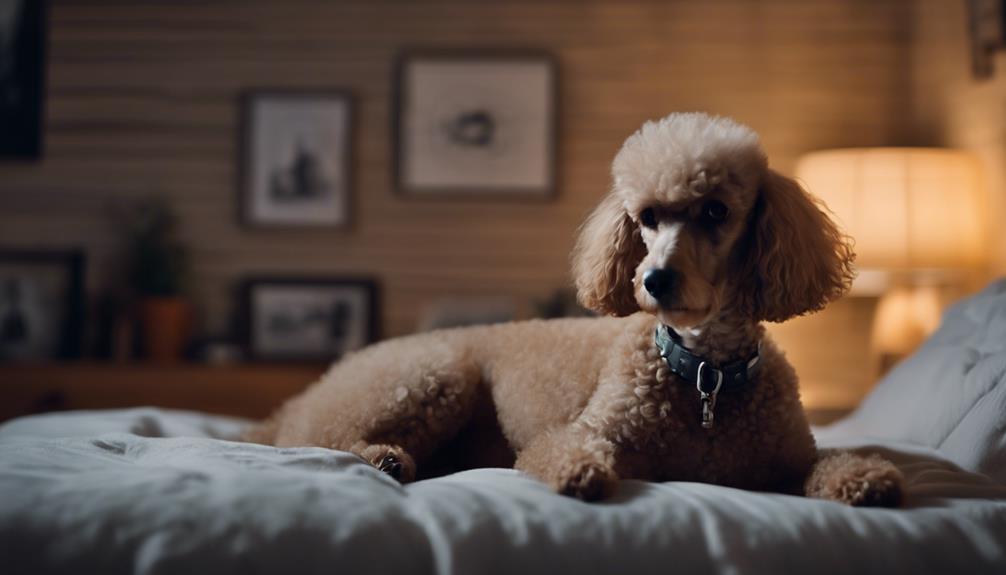
When crate training your poodle, remember to select the right size crate for their comfort. Establishing a consistent crate training schedule can help your poodle adapt to their new environment. Using positive reinforcement techniques can make the crate a positive and safe space for your poodle.
Crate Size Selection
Consider the size of your poodle puppy's crate carefully to ensure they have enough room to move comfortably while feeling secure in their sleeping space. When selecting a crate size, remember these key points:
- Crate size considerations: Choose a crate that allows your poodle to stand, turn, and lie down comfortably.
- Ensuring comfort, security: The crate should not be too big to prevent accidents but should offer enough space for movement.
- Optimal space utilization, training success: Properly sized crates create a cozy and secure environment, promoting successful crate training for your poodle. Keep in mind your poodle's growth projections to select a crate that will accommodate their adult size while providing a sense of safety and stability.
Crate Training Schedule
To establish an effective crate training schedule for your poodle, consistency in bedtime and waking up times is crucial. Gradually increasing the duration of crate time can help your poodle adjust to being in the crate. Remember to use positive reinforcement, such as treats and praise, to create a positive association with the crate. Avoid using the crate as a form of punishment to prevent negative feelings towards it. Incorporate short periods of alone time in the crate during the day to prepare your poodle for longer nighttime crating. These crate training tips, along with sleep training strategies and bedtime routine essentials, will help make the crate a comfortable and safe space for your poodle.
Addressing Separation Anxiety

If your poodle exhibits signs of separation anxiety, addressing this issue is crucial for their well-being and your nighttime peace. Separation anxiety management and behavior modification techniques are essential to help your poodle feel more comfortable when alone. Consider incorporating relaxation techniques and calming aids to create a soothing environment for your furry friend. Bonding activities and trust-building exercises can also strengthen the relationship between you and your poodle, helping them feel more secure and less anxious when left alone. Remember, patience and consistency are key when working through separation anxiety with your poodle. By implementing these strategies and seeking professional guidance if needed, you can help your poodle overcome their separation anxiety and enjoy a peaceful nighttime routine.
Dealing With Nighttime Accidents
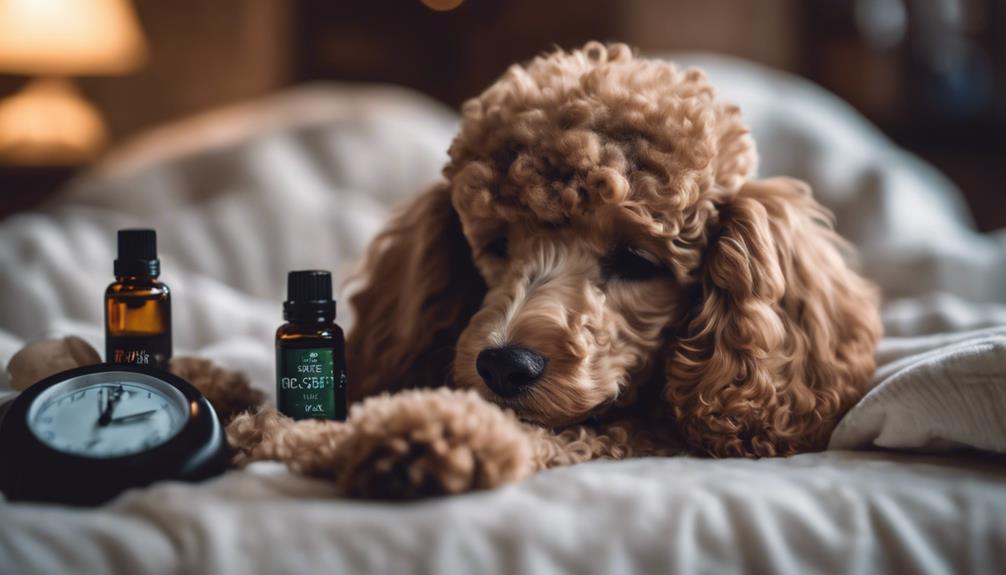
If your poodle is still having nighttime accidents, establishing a consistent potty schedule and avoiding water or food close to bedtime can help minimize these incidents. Puppies, due to their limited bladder control, may struggle with holding it through the night. By taking your poodle out for a final potty break just before bedtime and ensuring they have emptied their bladder, you can reduce the likelihood of accidents. Additionally, supervising your poodle during the night and providing them with regular opportunities to go outside can aid in accident prevention.
Positive reinforcement is key in nighttime training. Reward your poodle with treats or praise when they successfully go potty outside. This encourages good behavior and reinforces the idea that going outside is the right place to potty. In the event of accidents, clean up promptly using enzymatic cleaners to eliminate odors completely. This helps prevent repeat incidents as dogs are drawn to areas that smell of their urine. Consistency in your approach, along with patience and positive reinforcement, will help your poodle learn good nighttime habits.
Consulting a Professional Sleep Trainer
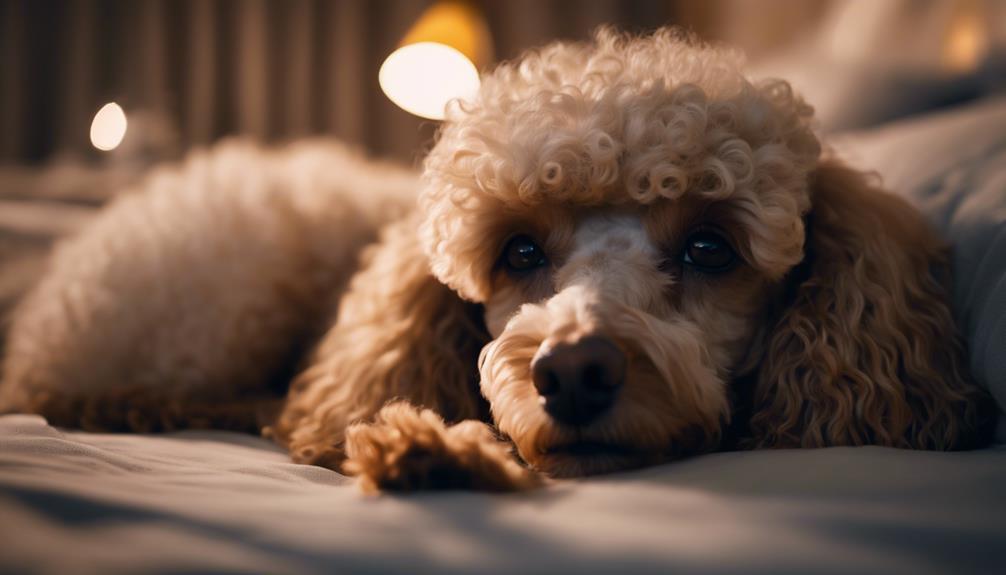
Consider reaching out to a professional sleep trainer for tailored guidance in establishing effective bedtime routines for your poodle puppy. These experts offer a range of benefits that could significantly improve your puppy's sleep habits:
- Sleep Consultant Benefits: Professional sleep trainers possess the knowledge and experience to address your poodle puppy's specific sleep challenges effectively.
- Personalized Guidance Advantages: By assessing your puppy's unique needs and behavior patterns, a sleep trainer can provide personalized advice tailored to your furry friend.
- Customized Training Plans: A professional sleep trainer will create a customized sleep training plan based on your poodle's individual requirements, ensuring a targeted approach to improving their sleep patterns.
With the help of a professional sleep trainer, you can receive expert advice on crate training, handling nighttime waking, and promoting better sleep habits for your poodle puppy. Their guidance can lead to quicker and more successful results, ultimately enhancing your puppy's overall well-being and quality of life.
Frequently Asked Questions
What Is the Sleep Schedule for a Poodle?
Your poodle's sleep schedule is crucial for their behavior, training, and health. Ensure they get around 10 hours of sleep each night by setting a consistent bedtime around 9 pm and creating a calm environment for better rest.
How Do You Discipline a Poodle?
To discipline a poodle effectively, focus on positive reinforcement and consistency. Establish clear boundaries and rules. Use a reward system and various training techniques. Avoid harsh methods and opt for gentle discipline to nurture good behavior.
How Do I Get My Poodle to Sleep?
To help your poodle sleep better, start with a cozy crate training routine. Establish soothing bedtime rituals and practice comforting techniques like familiar toys or calming music. Consistency and patience will guide your poodle to peaceful slumber.
At What Age Do Toy Poodles Sleep Through the Night?
You can expect Toy Poodles to start sleeping through the night without potty breaks around 4 to 6 months. Establishing consistent bedtime routines and crate training can help. Monitoring water intake and last potty break before bed aids in uninterrupted sleep.
Conclusion
In conclusion, establishing a nighttime routine and sleep training for your poodle is crucial for their well-being. While it may be challenging at first, consistency and patience will pay off in the long run. Remember, your poodle's quality of sleep directly impacts their overall health and happiness. So, embrace the process, stay committed, and watch as your furry friend enjoys restful nights and vibrant days. You and your poodle deserve a peaceful night's sleep together.
